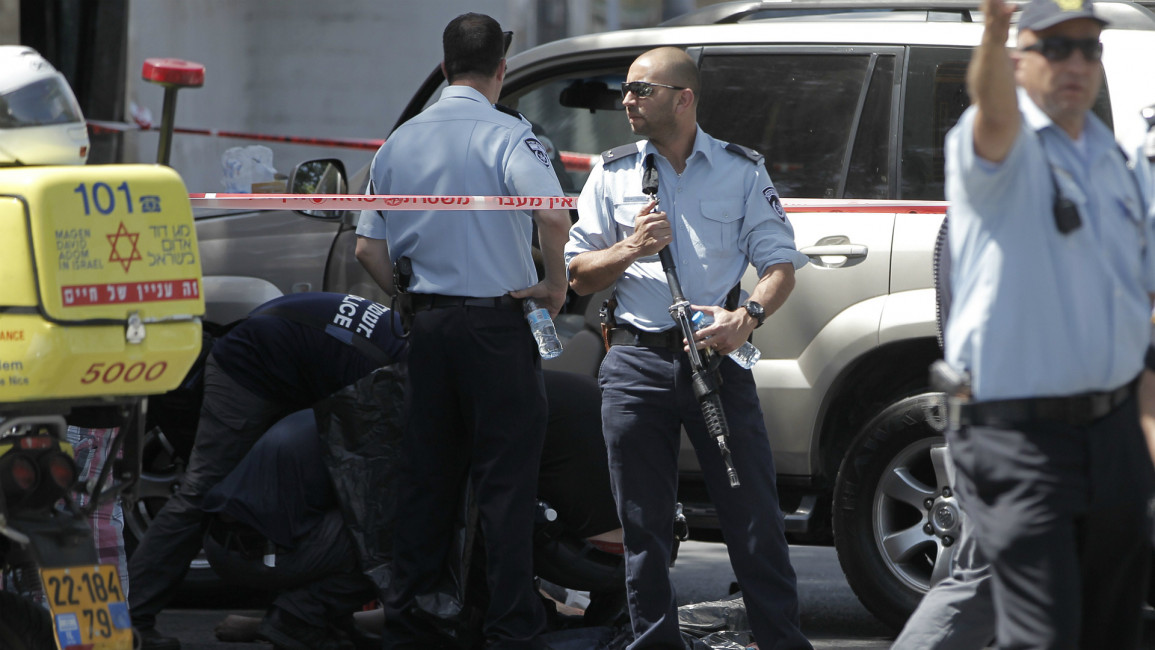Jerusalem clashes after Israeli police kill Palestinian
Clashes erupted in Occupied East Jerusalem Wednesday between Palestinians and Israeli police after a Palestinian man was shot dead when his car veered off the road and struck two Israeli policemen.
The murdered driver was identified by relatives as 41-year-old Imran Abu Dheim from the East Jerusalem neighbourhood of Jabal Mukaber.
"We're absolutely stunned by what's happened," a cousin of the driver told AFP, describing him as a very quiet man with five adult children.
"It was an accident and when he tried to reverse, they killed him," he said, citing eyewitnesses at the scene.
The incident took place in A-Tur on the Mount of Olives and the two policemen, who were moderately injured, were taken to different hospitals in the city.
Palestinian protesters burnt tires on roads leading to Abu Dheim's house in Jabal Mukaber in retaliation to the shooting, while police shot tear gas canisters and rubber bullets at the crowd. No injuries were reported.
The clashes come as Israeli Prime Minister Benjamin Netanyahu ordered the suspension of a controversial ban on Palestinians riding the same buses as Jewish settlers when returning from Israel to the West Bank.
Israeli Defence Minister Moshe Yaalon launched the three-month pilot programme following "repeated complaints" from Jewish settlers who ride the buses.
But an official in the prime minister's office said Netanyahu called Yaalon to tell him he found his proposal "unacceptable" and the two then decided to freeze the plan.
The proposal quickly came under fire with critics deriding it as racist.
Human rights groups criticised the programme saying it perpetuates and expands the existing apartheid system in the occupied territories.
The Peace Now watchdog said the application of such a measure was "unprecedented" since Israel seized the West Bank from Jordan in the 1967 Six Day War.
"This decision and the continuation of settlement activity proves that the settlers are leading us toward the right into an apartheid regime and to moral bankruptcy," spokeswoman Hagit Ofran said.
Opposition leader Isaac Herzog lashed out at the government, describing the measure as a move which would backfire.
"The separation between Palestinians and Jews on public transportation is an unnecessary humiliation and a stain on the face of the country and its citizens," Herzog wrote on his Facebook page.
"It adds unnecessary oil to the bonfire of hate against Israel in the world" he added.
Zehava Galon, leader of the dovish Meretz party, went further, saying, "This is how apartheid looks."
Former Likud minister Gideon Sa'ar strongly denounced the plan saying it would "severely damage Israel’s international stand."
The proposal even came under fire from backers of the settlements, who said it did not promote their cause and created undue damage to Israel's image.
The proposed plan would have banned Palestinian labourers working in Israel from using Israeli buses, which run from settlements along roads that Palestinians in general are prohibited from using.
Instead, the Palestinian labourers would have been assigned special buses running from and into specific stations at four main checkpoints separating Israel from the West Bank.
This would have meant extending their journey by more than two hours to reach the Israeli checkpoints where they are allowed to travel from to and from their workplace, through a network of bypass roads.
These bypass roads sometimes make a journey of only a few kilometres last many hours.
Later Wednesday, Netanyahu is scheduled to meet the European Union's foreign policy chief, Federica Mogherini.
The EU has voiced harsh criticism of Israeli settlements, and some countries are pushing for the bloc to require goods produced in settlements to have special labels if they are to be sold in Europe.


![President Pezeshkian has denounced Israel's attacks on Lebanon [Getty]](/sites/default/files/styles/image_684x385/public/2173482924.jpeg?h=a5f2f23a&itok=q3evVtko)



 Follow the Middle East's top stories in English at The New Arab on Google News
Follow the Middle East's top stories in English at The New Arab on Google News


